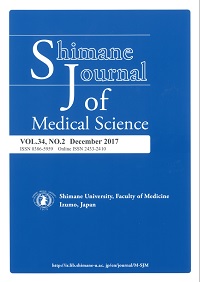Shimane University Faculty of Medicine
ISSN :0386-5959(冊子体)
ISSN :2433-2410(オンライン)


これらの論文は クリエイティブ・コモンズ 表示 - 非営利 - 改変禁止 4.0 国際 ライセンスの下に提供されています。
ダウンロード数 : ? 件
この文献の参照には次のURLをご利用ください : https://ir.lib.shimane-u.ac.jp/5892
Shimane Journal of Medical Science 18 2
2000-12-01 発行
Mouse Rt6.1 ADP-ribosyltranferase expressed on COS-7 cells catalyzes NAD glycohydrolysis
ファイル
内容記述(抄録等)
Mouse T-cell antigen Rt6.1 is a glycosylphosphatidylinositol ( GPI) -anchored arginine-specific Abp-ribosyltransferase and can transfer ADP-ribose moiety of NAD to an arginine residue of a target protein, forming ADP-ribose-acceptor adducts. Depending on the amounts of ADP-ribose acceptor substrates, a soluble form of Rt6.1 expressed by Escherichia coli can catalyze not only ADP-ribosylation but also NAD glycohydrolysis in vitro. However, it has not yet been determined whether native form of Rt6.1, namely the protein expressed on cell surface as a GPI-anchored form, could catalyze NAD glycohydrolysis. To address this issue, we expressed Rt6.1 on COS-7 cells as a GPI-anchored form and investigated NAD glycohydrolysis by the cells. During incubation with NAD. Rt6.1 CDNA-transfected COS-7 cells hydrolyzed NAD to liberate free ADP-ribose. At the same time, the cells ADP-ribosylated arginine residues of several cell surface proteins. These results indicate that cell surface Rt6.1 catalyzes NAD glycohydrolysis, even in the presence of ADP-ribose acceptor substrate on the cell, and suggest that the NADase activity may also have significant meanings in vivo.
About This Article
Other Article
PP. 27 - 30
PP. 31 - 34
